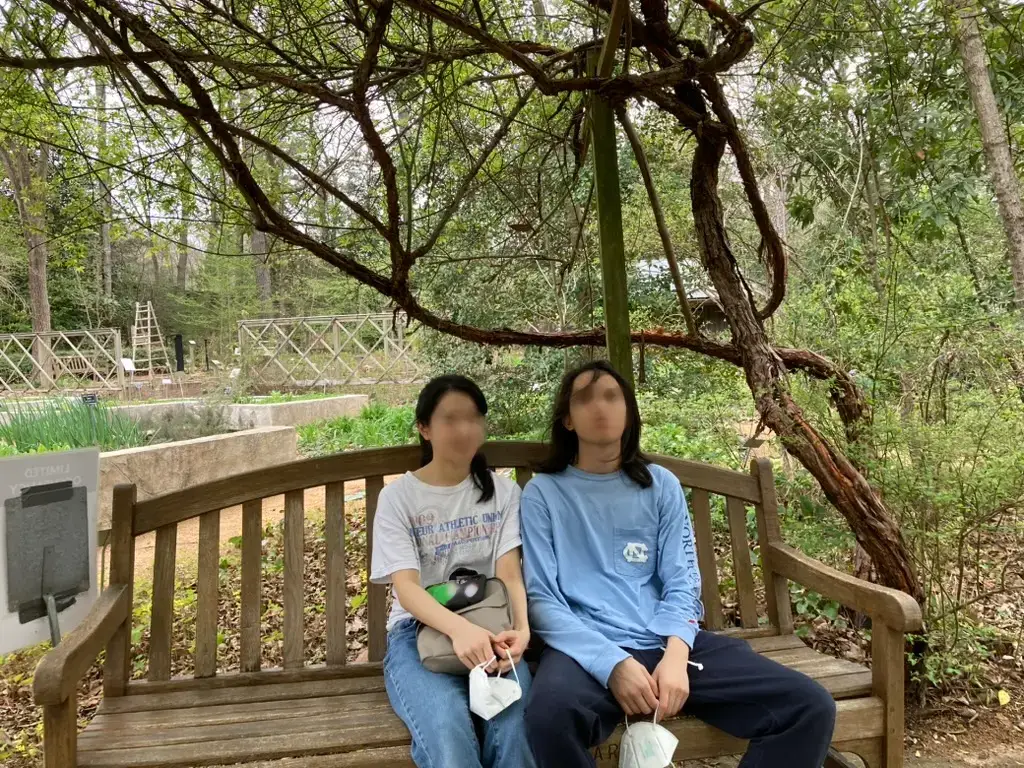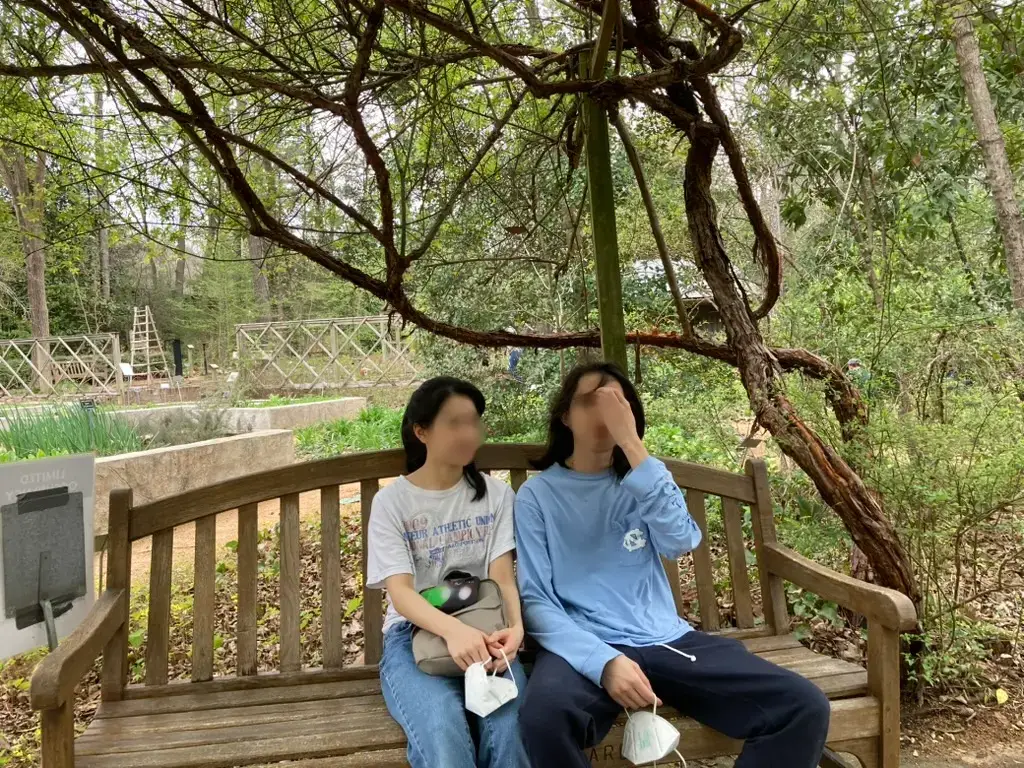Have you ever looked back at a recent picture and have no recollection of it?
Well a while back, I had a moment like that when I was browsing through photos on my phone and stumbled across two pictures of a family trip taken about 4 years ago.
To be fair, memorization was never my strongest suit, but those photos weren’t like the maps I had to label on a geography test or pictures of my primordial times - I usually remember the family trips and the general context for ones this fairly recent. But for the life of me, I couldn’t remember why I was there. These photos were taken during Covid, and they showed us visiting my college, and I looked like a sweaty incel with my long hair. But beyond that, I couldn’t recall anything more: the camera roll had more of us attending my roommate’s graduation and staying in our college apartment, but how come I was there for so long? Wasn’t I always back home working remotely on my new job? In any case, there was a larger than usual blankness that I couldn’t exactly put into words, and those pictures felt like frames of synthetic memory that were awkwardly inserted into the white space.
Then about a year ago, I was let go from my job during a massive wave of tech lay-offs. It was a job I dreaded waking up for but didn’t have the balls to quit, so when someone else made the decision for me, I decided to lay low a bit and pick up a passion project building a personal wiki.
Why a wiki? I was introduced by Nick Milo to this idea of personal knowledge management (PKM), a note taking/information management system that promises you to accumulate learnings reliably from your information stream and accelerate your creativity. It was the perfect advertisement to a sense of failure I’d been feeling on the job: I wasn’t bad at it, and I get things done fairly reliably. But every few weeks or so, a haze would dawn on me: what really have I been working on? And where did all the time go? Slowly, the days would blend together into an all-existing stasis: yesterday was today, and so is tomorrow. Shortly after the lay-off and resurrecting my college resumé, I came to the sad realization that out of my three and half years there, there wasn’t any accomplishment I was particularly proud to add to it. If there was any remnant proving otherwise, it was all within the promo documents that are now wiped clean after getting prime delivered out of my laptop. So whether it was those impending behavioral tech interviews1 or my forgetfulness of family events, a paranoia drove me towards this wiki project - I wanted to write them down, and write them down in an organized way to gain back a sense of control.
And so, I got deep into PKM and the adjacent rabbit holes of Zettelkasten, Tools for thought, and Obsidian. It’s hard to describe in simple terms what this community is all about, but it’s a weird flavor of productivity porn amassing many kinds of people - writers, researchers, religious note-takers, digital hoarders, self-improvement hackers, amateur software builders, etc. What people make here resembles a wiki, but a personal one is more akin to a mind garage; you jot down your ever expanding thoughts, and leverage whatever tools to index/cluster them into a personally meaningful way.
Being a noob, I followed mostly Nick’s thing at first and layered my own interpretation on top (an ungodly amount of toy JavaScripts and the categorizing “map” notes), and… it failed spectacularly. As it turns out, there is no generic template nor instruction anyone can give you for thinking and creating. But also, UX is pretty hard; what’s harder is simultaneously being your own UX designer, coder, and user, and what’s even harder is to do it as someone who’s kinda obsessive about petty details yet not so grounded in who he is and what he’s looking for - a wanna-be writer but without many things written, a builder but has never really built anything of his own.
After a long period of searching and removing many of the fluff and processes, I slowly figured out more of myself and what I want out of this thing. What really stuck was a simple daily journaling and writing practice
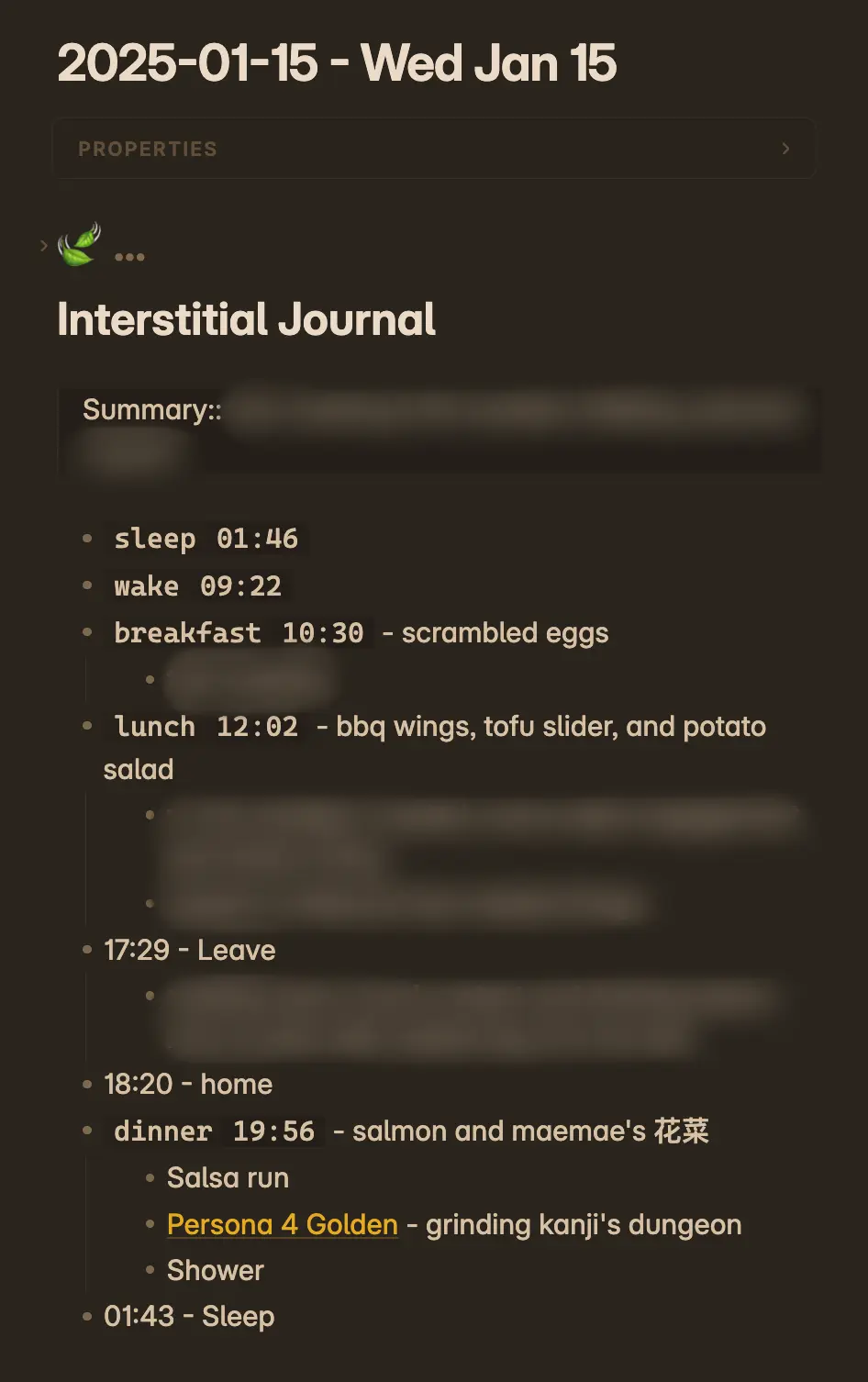
Interstitial journaling was one of the game changers I discovered for writing about your day. It’s a form of bullet journaling that you build as you progress throughout the day
The basic idea of interstitial journaling is to write a few lines every time you take a break, and to track the exact time you are taking these notes - Anne-Laure Le Cunff
Rather than going through herculean effort of recalling all that’s happened each night, journaling this way becomes jotting down the most interesting things that’ve transpired between timestamps. Most of the “journaling” I do during the day is simply dropping bulleted timestamps with a small toolbar shortcut. They are the little invitations for myself to add more later when things wind down. Like like any journal, it’s a self-reflection space, not a timetable that you’re micro-managing yourself with, so freely exercise any selection bias here. The main thing is figuring out what’s a good interval for yourself, so it doesn’t get in the way of the day.
To do less doomscrolling, I also jot down thoughts around my information stream. I start most of my writings here, typically writing out my full thoughts first, and then link or extract things out afterwards to bootstrap ideas I’m interested in going back later. This idea came from Sarah Constantin’s public roam notebook, which I found from this ribbonfarm post.
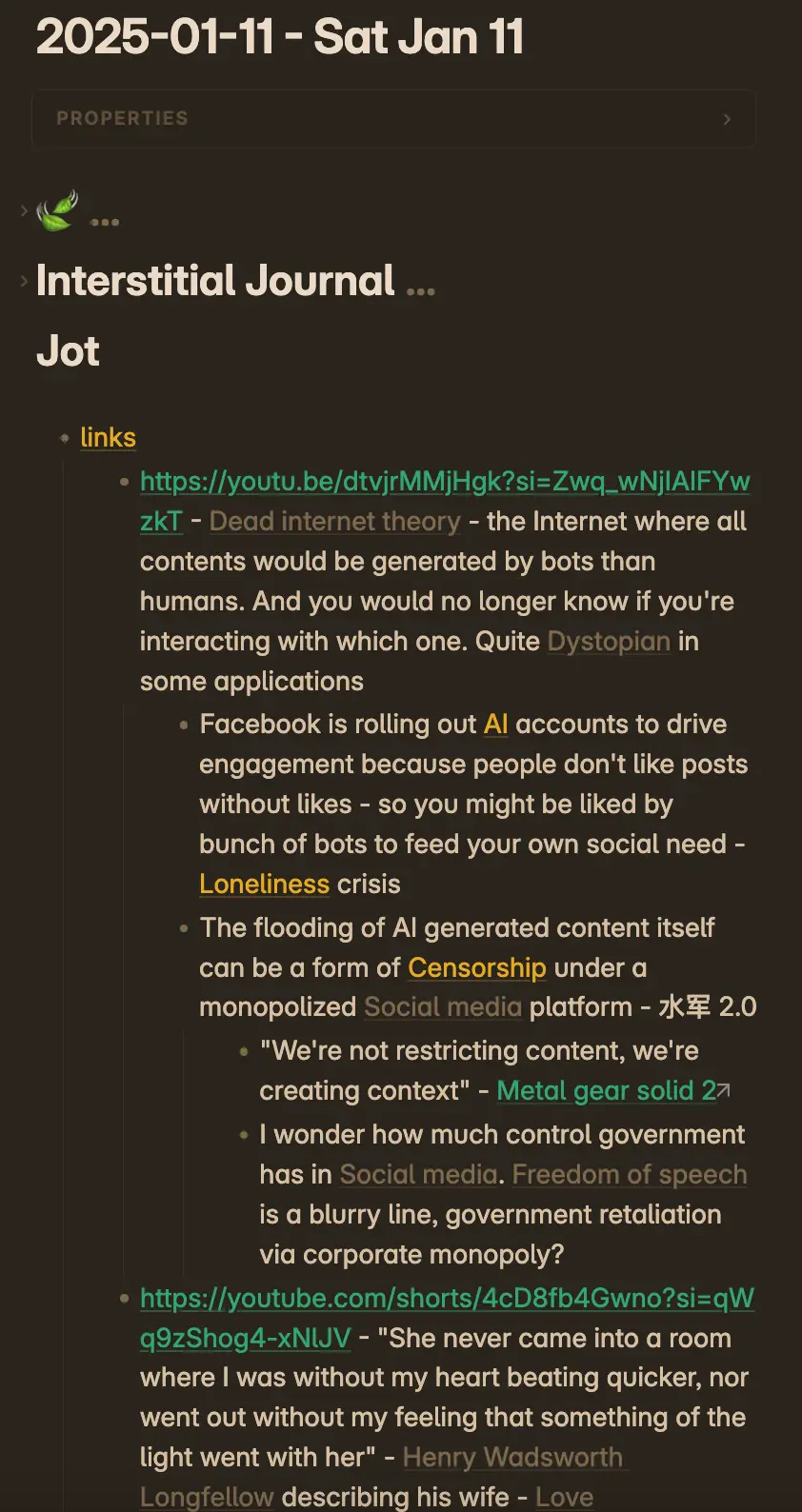
If daily note is about developing a semi-automatic habit of writing everyday, logs are entries of a certain “theme” I stack on top of the day, depending on how the day’s like. I keep a separate journal log for things that resonate with me emotionally in some way: raw observations of the world, a memorable conversation, a flittering thought that felt like a key to self insight. They’re extensions to the bullet points of the day and are essentially a traditional, physical journal with pages stitched together.
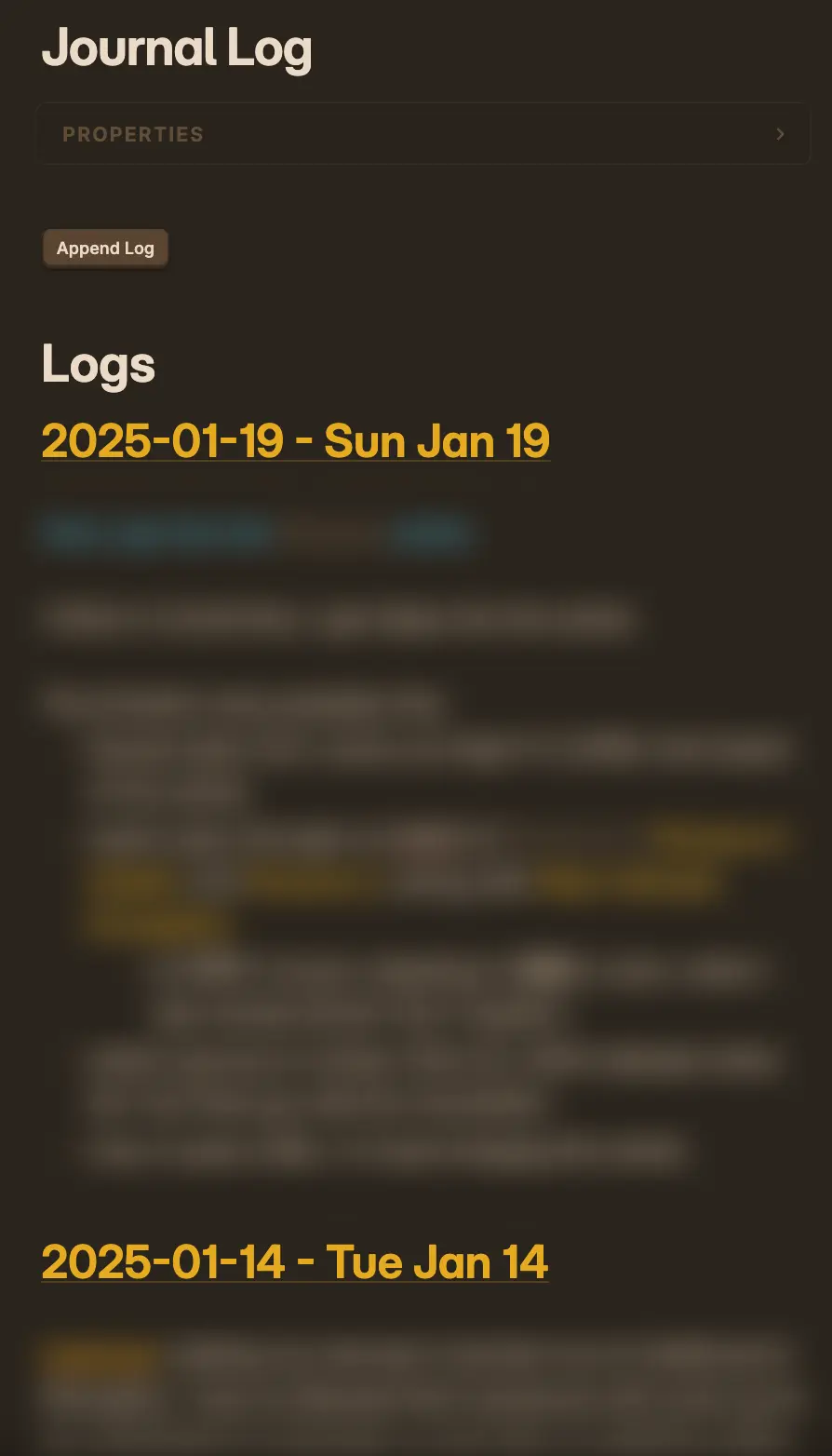
Lastly, my daily note is synced with Google photos. In a way, I think of my journals as a personal text index to an otherwise disorganized set of pictures on my phone.
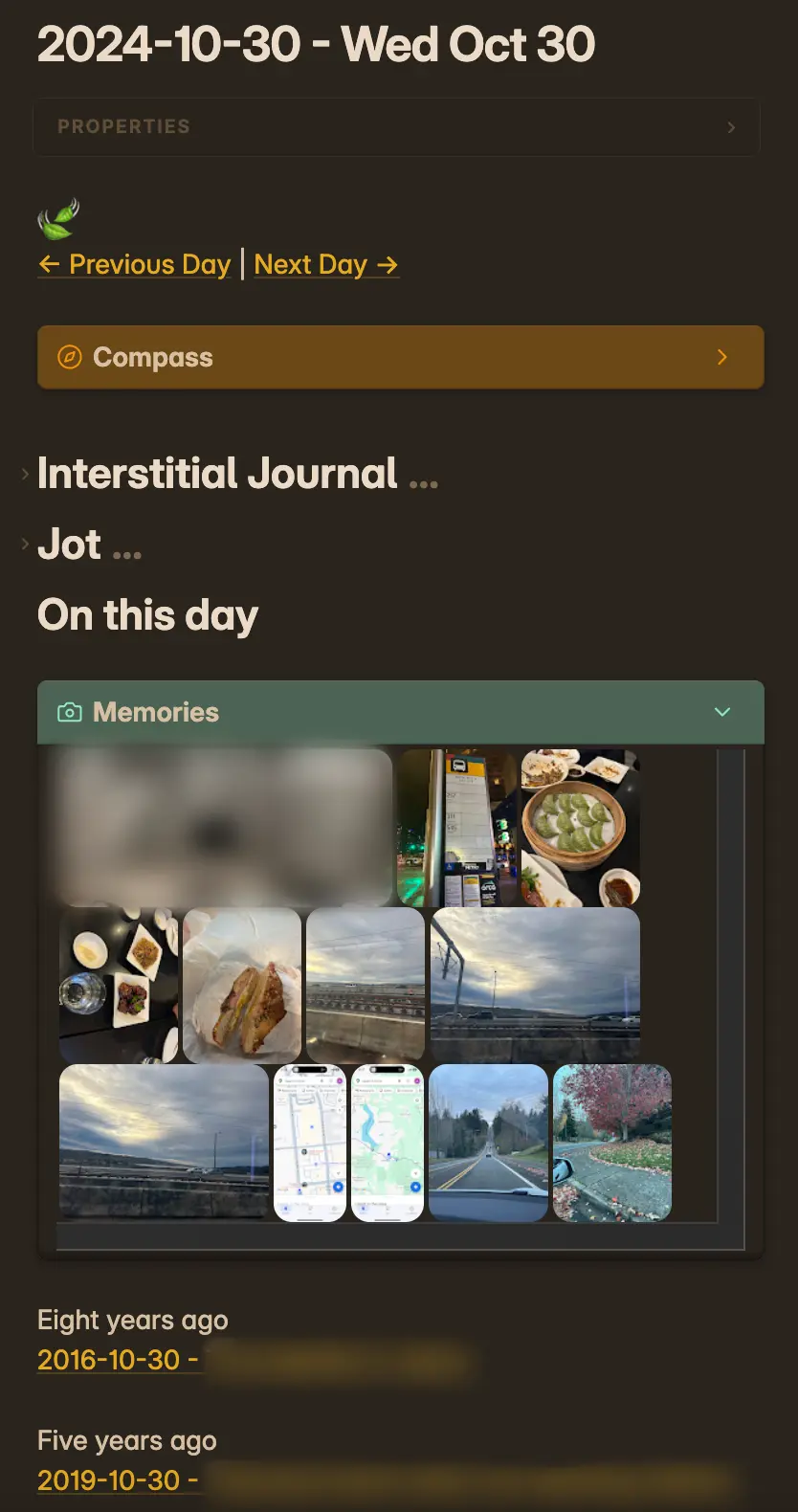
Some days are special, like the Christmas Eve last year when I attended a candle light service with my girlfriend. I call those days “occasions” and give them a tag.
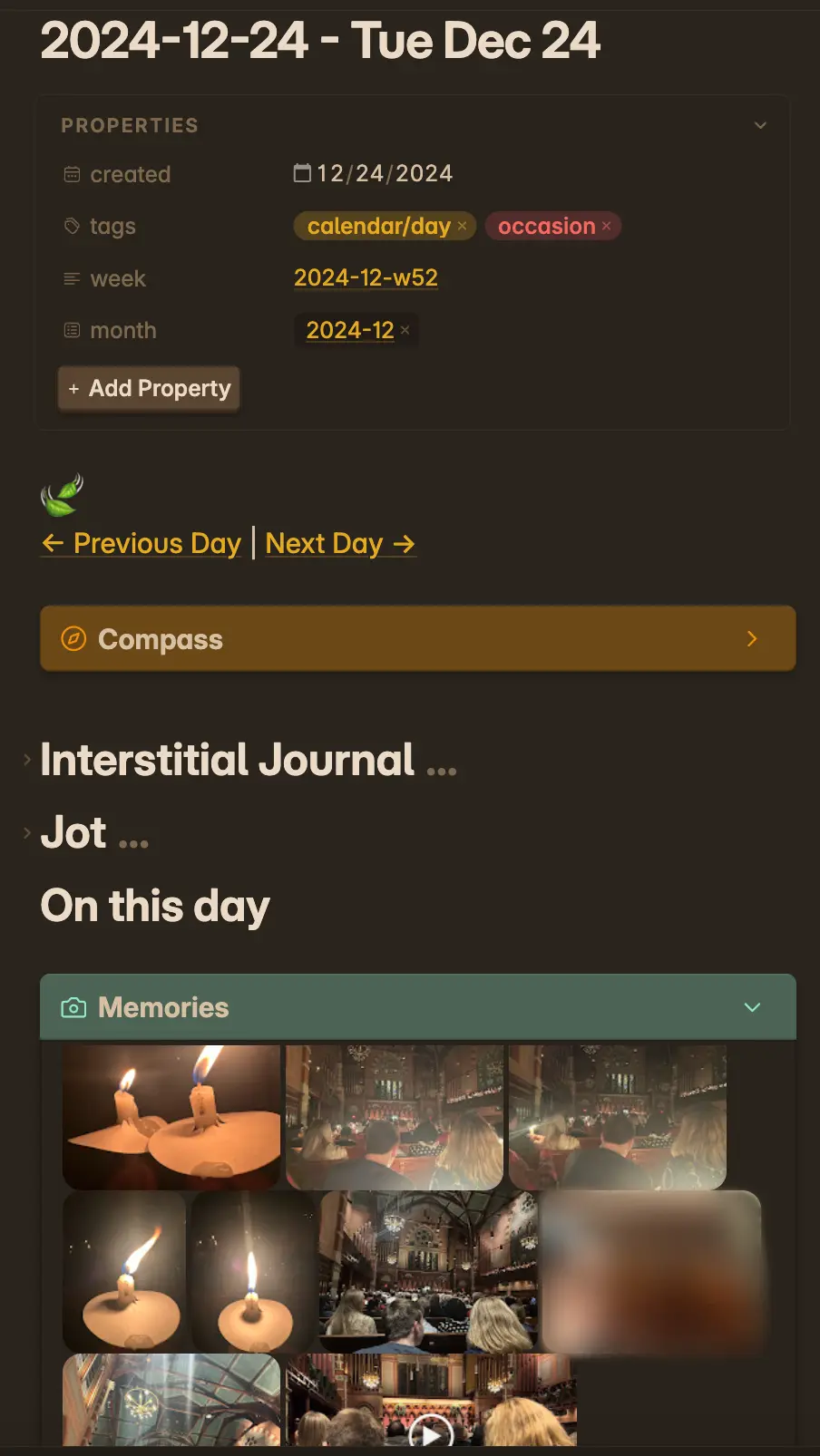
Those days then show up in the weekly notes with a little star beside them and in my own version of “year wrapped”
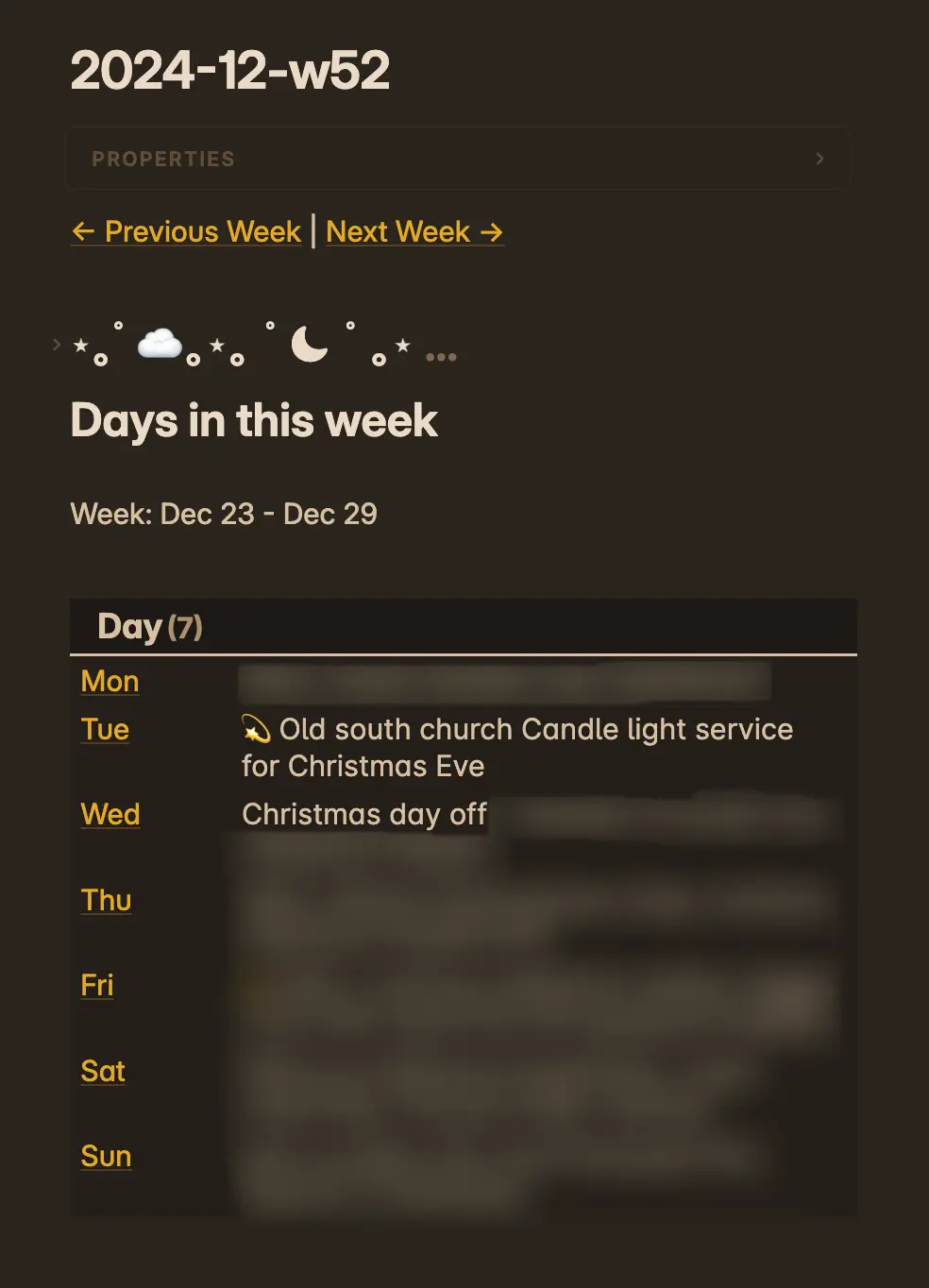
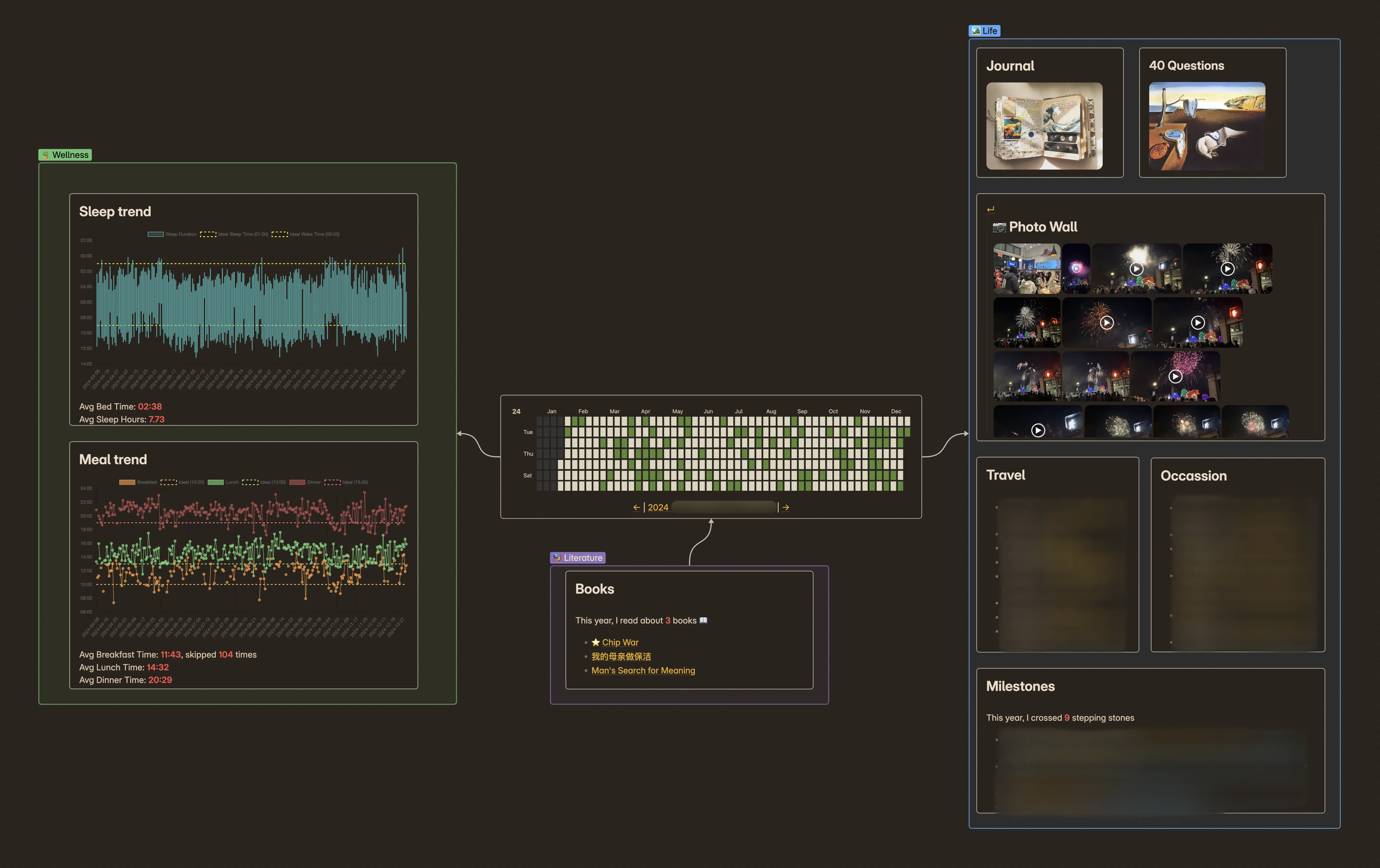 See here if you’re interested to check it out more
See here if you’re interested to check it out more
I’ve been consistently journaling everyday for over a year now, which is pretty rare to say for a disorganized dude that almost has exclusively bad habits. It helps me in some trivial ways, like finding out how long something’s been in the fridge, but also in some small, transformative ways. It made me a lot more aware of the passage of time, how finite the days are, and how fast they go by; journaling helps slow down time a bit as I live through them. It gives me instant feedback for the day, regardless of how good or bad they have been.
In the process of building this, I also went back to organize my old Apple notes; and reading those entries brought back some sense of the times around those pictures. I am someone who tends to get easily lost in my head, over some minute details that are hard for me to let go. I have always been this way, ever since I was a kid. But what’s apparent from those journals was an absent-mindedness that got more out of control than the usual. Because I was a new college graduate at that time, some of the mental fog came from the natural friction of transitioning into the workforce and adapting to office culture. Though amidst the isolated state of the world, it was largely grief that colored that time into whiteness:
“The days were an unending funeral, and every little thing became ritualistic in some way…” - 04-2021
From interactions with co-workers, to little feedback from managers, events from this world would often tunnel me back to that chapel inside my head; many things kept me there - guilt, shame, loneliness; those shadows of the past gripped onto me, and I stayed there for a long, long time. I didn’t remember, because I simply wasn’t there.
Slowly throughout those years, it morphed and grew into the fear of letting things go, into the paranoia behind this project. It made sense why those pictures bothered me so much. I was afraid of making a worse mistake than I’ve already made as a kid: not paying attention to the people I have and being present when they were right in front of me.
I didn’t really treasure my days, and it’s a lesson I’m continuing to learn: regardless of how they’re being recorded, days are irrevocably gone if I don’t live them well.
Out of the many things I learnt from building in and using Obsidian, my biggest insight was nothing computational in nature but rather the act of writing itself. Writing is both a process of searching and the preservation of it. With information becoming ever easier to produce, circulate, and consume, writing carves out some space for ourselves, for information that means something to us not to be lost in the stream.
I hope this gives a little bit of inspiration to those who want to try journaling more consistently this year. A digital medium is something that just happens to work for me, since I grew up with a phone and used to texting myself inside note apps. It helps me write anywhere at anytime, but most of all, writing gives me a chance to mold the present from the past, so I can live better tomorrow
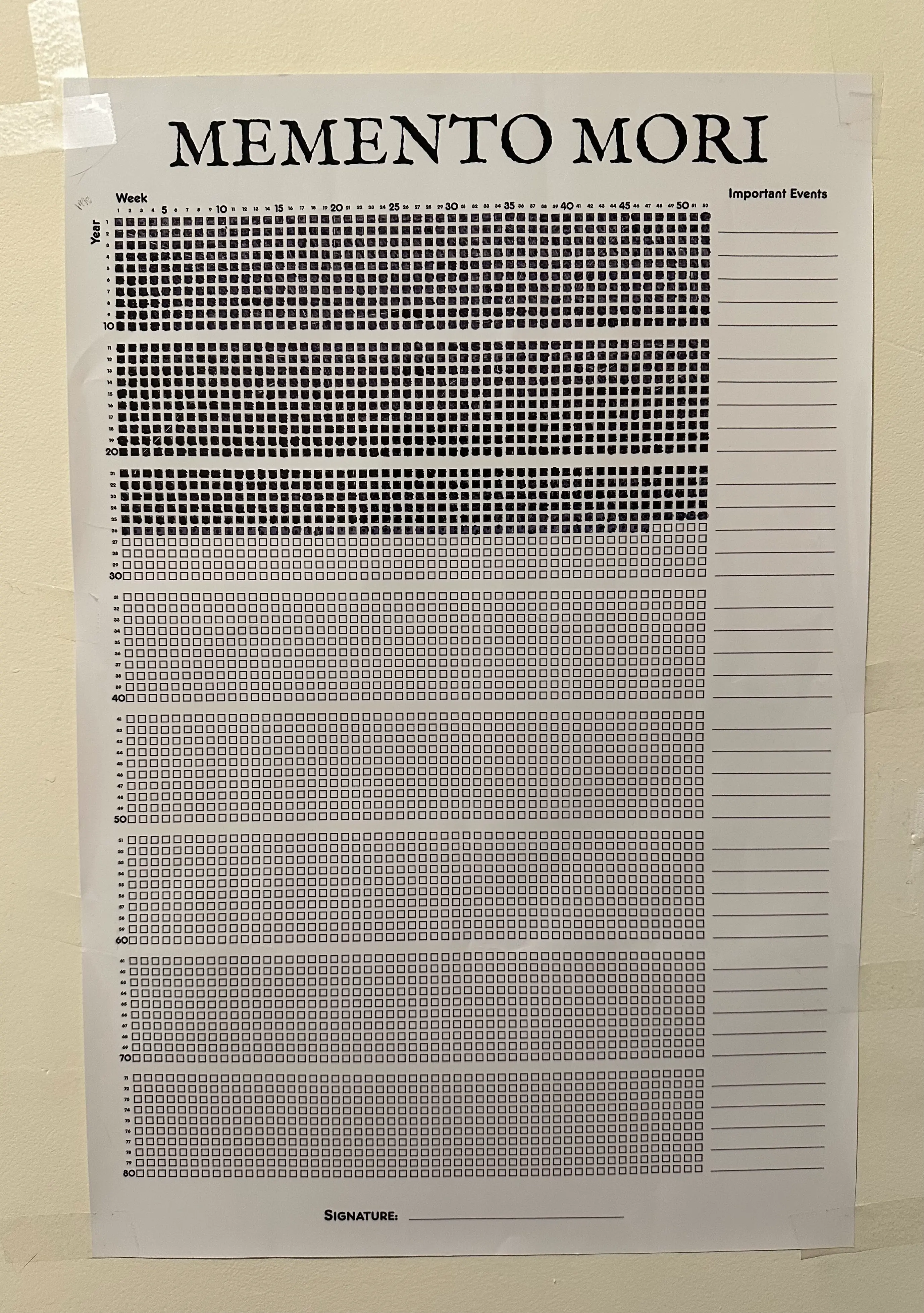
The life calendar in my room
Footnotes
-
for those interviewing, it’s mostly the
bullshittingdelivery that matters than recalling details of your past work (though recordings definitely help in preparation!) ↩
